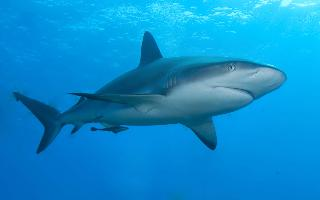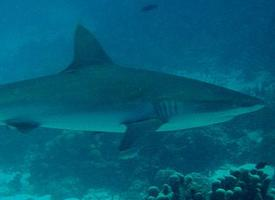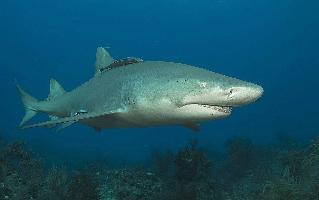
Állatleírás
The Dusky Shark (Carcharhinus obscurus) is a large, slow-growing, and long-lived species of requiem shark, belonging to the family Carcharhinidae. This species is known for its sleek, streamlined body, which is built for efficient cruising through the open ocean. It can be found in temperate, tropical, and subtropical waters worldwide, from the coastal regions to the outer continental shelves.Dusky Sharks have a distinctive appearance that sets them apart from other sharks. They are characterized by their dusky-gray coloration, which seamlessly blends into the oceanic environment, providing them with excellent camouflage against predators and prey alike. They have a rounded snout and long, slender pectoral fins, which are proportionally longer than those of most other shark species. These fins play a critical role in their ability to maneuver and maintain stability in the water.
Adult Dusky Sharks can reach lengths of up to 4.2 meters (about 14 feet), though most individuals are smaller, typically around 3.2 meters (about 10 feet). They have a robust and muscular body, with a broad, rounded head and large, compound eyes that afford them excellent vision in the dimly lit waters of their deep-sea habitats.
The diet of the Dusky Shark is varied and opportunistic, consisting of a wide range of prey items including fish, cephalopods (such as squids and octopuses), and smaller sharks. Their strong, serrated teeth and powerful jaws allow them to tackle and subdue a variety of prey, which they hunt both alone and in groups.
Dusky Sharks are known for their extensive migratory patterns, which are driven by the search for food and suitable breeding grounds. They are capable of traveling vast distances across the ocean, demonstrating remarkable navigational skills.
Reproduction in Dusky Sharks is viviparous, meaning they give birth to live young rather than laying eggs. The gestation period is notably long, lasting up to 22 months, one of the longest of any shark species. Females give birth to litters of 6 to 12 pups, which are born fully developed and ready to fend for themselves.
Despite their formidable size and predatory capabilities, Dusky Sharks face significant threats from human activities. They are frequently caught as bycatch in commercial fishing operations and are targeted for their fins, meat, and liver oil. Their slow growth and reproductive rates make them particularly vulnerable to overfishing, leading to declining populations in many parts of their range. Consequently, the International Union for Conservation of Nature (IUCN) has listed the Dusky Shark as Vulnerable, highlighting the urgent need for conservation measures to protect this remarkable species.
In summary, the Dusky Shark is a fascinating and important predator of the world's oceans, playing a critical role in maintaining the balance of marine ecosystems. Its impressive adaptations and behaviors make it a subject of interest for scientists and conservationists alike, who are working to ensure its survival in the face of increasing human pressures
Hasonló állatok
Új állatfotók
Top 10 állat
- Dolphin gull (Leucophaeus scoresbii)
- Japanese macaque (Macaca fuscata)
- Stone loach (Barbatula barbatula)
- Russian tortoise (Testudo horsfieldii)
- Galápagos tortoise (Geochelone nigra complex)
- Greek tortoise (Testudo graeca)
- Diana monkey (Cercopithecus diana)
- Common flying dragon (Draco volans)
- Moustached guenon (Cercopithecus cephus)
- Galápagos penguin (Spheniscus mendiculus)


